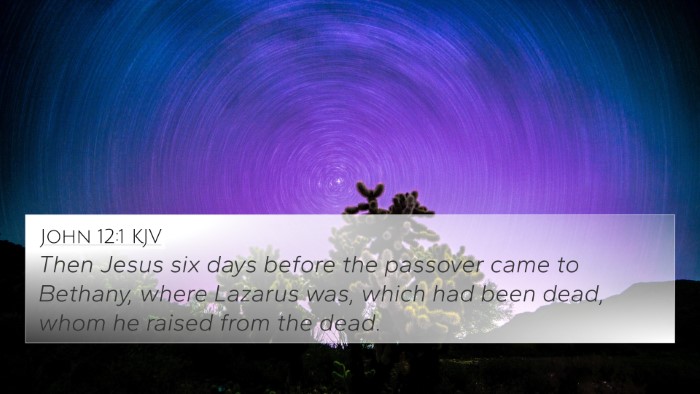Bible Verse Meaning of John 11:1
Verse: John 11:1 - "Now a certain man was sick, named Lazarus, of Bethany, the town of Mary and her sister Martha."
This verse introduces the story of Lazarus, a significant figure in the New Testament, highlighting the intimate relationship between Jesus and Lazarus' family. Understanding John 11:1 requires examining the cultural, theological, and personal dimensions of the characters presented.
Summary of Insights from Public Domain Commentaries
-
Matthew Henry:
Henry notes that Lazarus belonged to a family that had a close relationship with Jesus. The mention of his sickness sets the stage for a miraculous event, emphasizing God's power over death. It also serves to reveal the depth of divine compassion.
-
Albert Barnes:
Barnes points out that Lazarus’s illness serves as a narrative catalyst for demonstrating Jesus' authority. He also highlights the two sisters, Mary and Martha, who represent different aspects of faith and devotion, showing how their characters contrast in their responses to Jesus.
-
Adam Clarke:
Clarke emphasizes the significance of Bethany, the setting where Jesus performed this miracle, noting its proximity to Jerusalem and its role as a place of refuge for Jesus. This adds to the sense of urgency and importance of the event in the broader context of Jesus' ministry.
Thematic Connections and Cross-References
John 11:1 serves as a vital anchor for understanding the themes of sickness, death, and resurrection in the Bible. The following cross-references provide a deeper insight into these themes:
- John 11:5: "Now Jesus loved Martha, and her sister, and Lazarus." - This confirms the close relationship between Jesus and the family, setting the emotional context for the miracle.
- John 11:43-44: "And when he thus had spoken, he cried with a loud voice, Lazarus, come forth. And he that was dead came forth..." - This is the climactic moment of resurrection that highlights Jesus' power over death.
- Luke 8:49-56: The story of Jairus' daughter, which parallels Lazarus’ story in demonstrating Jesus' authority over illness and death.
- Mark 5:35-42: Another instance where Jesus raises someone from the dead, reinforcing the theme of resurrection.
- Romans 8:11: "But if the Spirit of him that raised up Jesus from the dead dwell in you..." - A New Testament reflection on resurrection power.
- 1 Thessalonians 4:14: Discusses resurrection and eternal life, linking back to the hope presented in Lazarus' story.
- Hebrews 2:14: Discusses Jesus’ victory over death, echoing the triumph depicted in the resurrection of Lazarus.
- John 3:16: "For God so loved the world..." - This love ties into Jesus' actions and motivations throughout John 11.
- Isaiah 25:8: "He will swallow up death in victory..." - An Old Testament prophecy that anticipates the New Testament fulfillment seen in Lazarus' resurrection.
- John 10:11: "I am the good shepherd: the good shepherd giveth his life for the sheep." - Here, Jesus speaks of His role in restoring life, foreshadowing the events surrounding Lazarus.
Understanding the Context
The context of John 11 involves not just a physical illness but also spiritual implications regarding faith, hope, and the nature of resurrection. Jesus' response to Lazarus' sickness reveals His divine timing and purpose, serving as a profound teaching moment for Mary, Martha, and the surrounding crowd.
Application for Study
For those studying the Bible, understanding cross-references like those seen in John 11:1 can illuminate how different scriptures interact and enhance one's comprehension of biblical themes. Utilizing tools such as a bible concordance or bible reference guide can aid in tracing these connections.
Conclusion
John 11:1 is not merely an introduction to Lazarus' story but a gateway to understanding the greater narrative of life, death, and resurrection within the Christian faith. Analyzing this verse with its cross-references broadens one’s understanding and facilitates deeper study into the interconnectedness of scripture.















